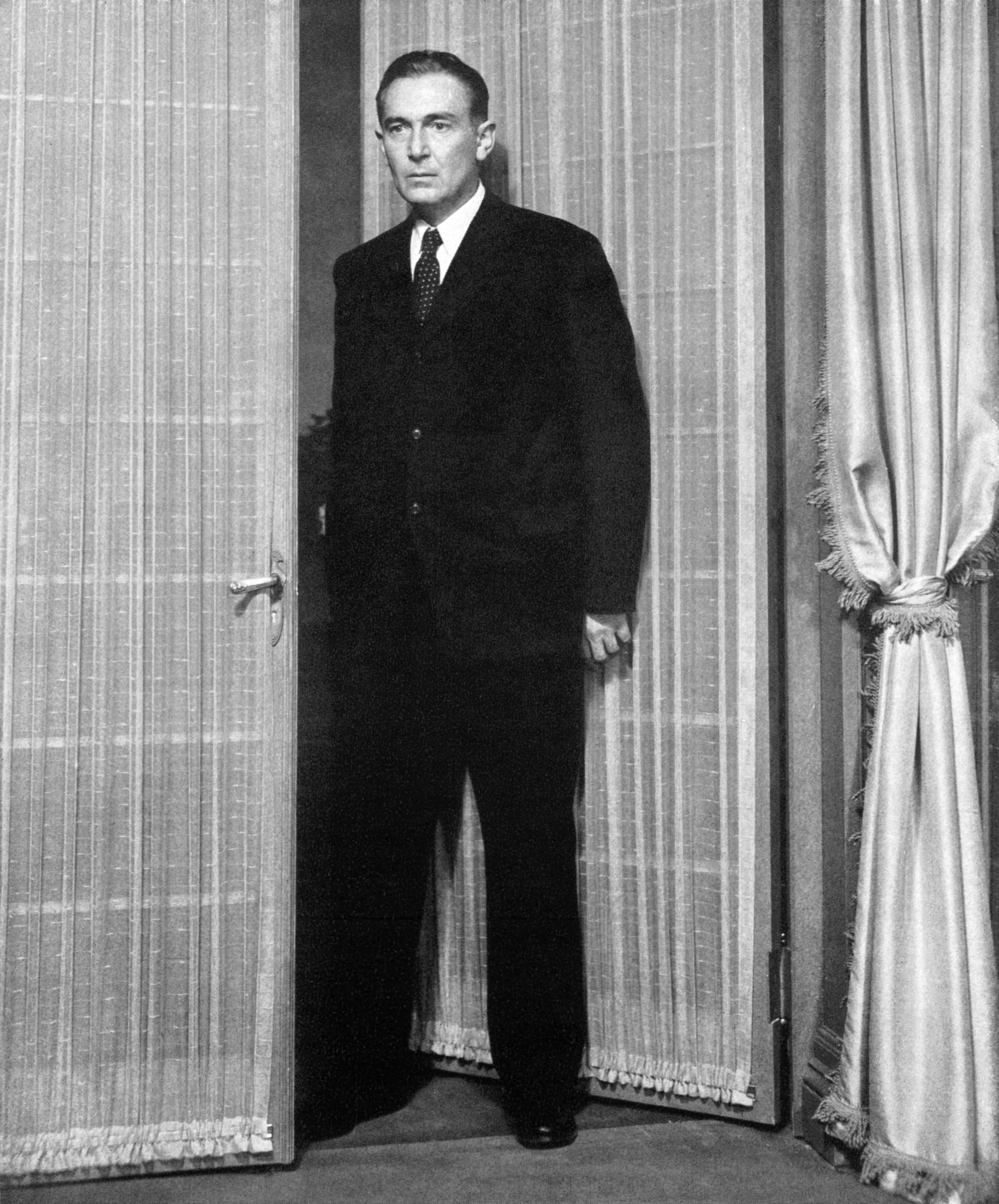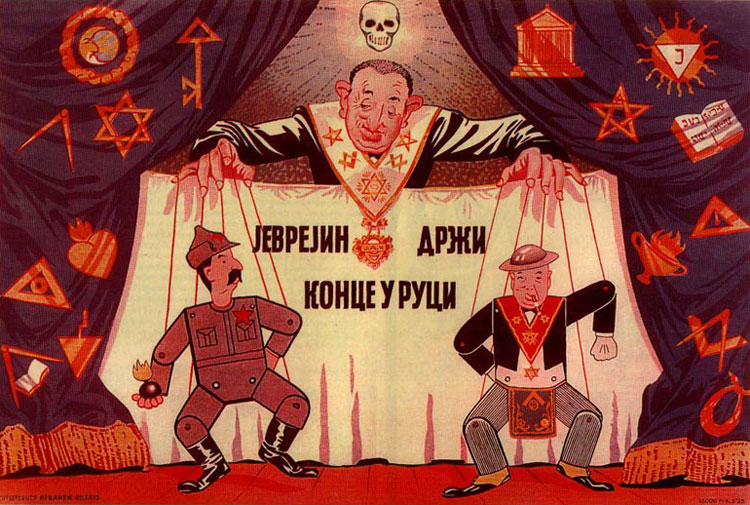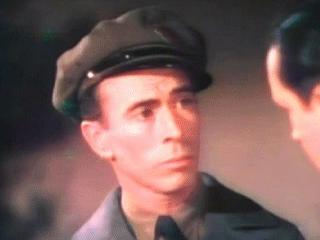|
Don't Be A Sucker
''Don't Be a Sucker'' is a short film produced by the United States Department of War released in 1943, and adapted as a slightly shorter version in 1947. It has anti-racist and anti-fascist themes, and was made to educate viewers about prejudice and discrimination. The film was also made to make the case for the desegregation of the United States armed forces. It is held for preservation by the U.S. National Archives. Plot An American Freemason who has been listening to a racist and bigoted rabble-rouser, who is preaching hate speech against ethnic and religious minorities and immigrants, is warned off by a naturalized Hungarian immigrant, possibly a Holocaust survivor or escapee, who explains to him how such rhetoric and demagoguery allowed the Nazis to rise to power in Weimar Germany, and warns Americans not to fall for similar demagoguery propagated by American racists and bigots. In popular culture In August 2017, the short film went viral on the internet in the afterm ... [...More Info...] [...Related Items...] OR: [Wikipedia] [Google] [Baidu] |
United States Department Of War
The United States Department of War, also called the War Department (and occasionally War Office in the early years), was the United States Cabinet department originally responsible for the operation and maintenance of the United States Army, also bearing responsibility for naval affairs until the establishment of the Navy Department in 1798, and for most land-based air forces until the creation of the Department of the Air Force on September 18, 1947. The Secretary of War, a civilian with such responsibilities as finance and purchases and a minor role in directing military affairs, headed the War Department throughout its existence. The War Department existed from August 7, 1789 until September 18, 1947, when it split into the Department of the Army and the Department of the Air Force. The Department of the Army and Department of the Air Force later joined the Department of the Navy under the United States Department of Defense in 1949. History 18th century The Departme ... [...More Info...] [...Related Items...] OR: [Wikipedia] [Google] [Baidu] |
Paul Lukas
Paul Lukas (born Pál Lukács; 26 May 1894 – 15 August 1971) was a Hungarian actor. He won the Academy Award for Best Actor, and the first Golden Globe Award for Best Actor – Motion Picture Drama for his performance in the film ''Watch on the Rhine'' (1943), reprising the role he created on the Broadway stage. Biography Lukas was born Pál Lukács in Budapest into a Jewish family, the son of Adolf Munkácsi and Mária Schneckendorf. He was later adopted by Mária (née Zilahy) and János Lukács, an advertising executive. Lukas made his stage debut in Budapest in 1916 and his film debut in 1917. At first, he played elegant, smooth womanizers, but increasingly he became typecast as a villain. He had a successful stage and film career in Hungary, Germany, and Austria, where he worked with Max Reinhardt. He arrived in Hollywood in 1927 and became a naturalized citizen of the United States in 1937. In 1935 he built a home near the new Racquet Club of Palm Springs, Califor ... [...More Info...] [...Related Items...] OR: [Wikipedia] [Google] [Baidu] |
1943 Short Films
Events Below, the events of World War II have the "WWII" prefix. January * January 1 – WWII: The Soviet Union announces that 22 German divisions have been encircled at Stalingrad, with 175,000 killed and 137,650 captured. * January 4 – WWII: Greek-Polish athlete and saboteur Jerzy Iwanow-Szajnowicz is executed by the Germans at Kaisariani. * January 11 ** The United States and United Kingdom revise previously unequal treaty relationships with the Republic of China (1912–1949), Republic of China. ** Italian-American anarchist Carlo Tresca is assassinated in New York City. * January 13 – Anti-Nazi protests in Sofia result in 200 arrests and 36 executions. * January 14 – January 24, 24 – WWII: Casablanca Conference: Franklin D. Roosevelt, President of the United States; Winston Churchill, Prime Minister of the United Kingdom; and Generals Charles de Gaulle and Henri Giraud of the Free French forces meet secretly at the Anfa Hotel in Casablanca, Morocco, to plan the ... [...More Info...] [...Related Items...] OR: [Wikipedia] [Google] [Baidu] |
Prelinger Archives
The Prelinger Archives is a collection of films relating to U.S. cultural history, the evolution of the American landscape, everyday life, and social history. It was in New York City from 1982 to 2002 and is now in San Francisco. History The Archives were founded by Rick Prelinger in 1982AudioRichard and Megan Prelinger interviewat KQED-FM (NPR) (1 hour) to preserve what he calls "ephemeral" films: films sponsored by corporations and organizations, educational films, and amateur and home movies. Typically, ephemeral films were produced to fulfill specific purposes at specific times, and many exist today only by chance or accident. About 65% of the Archive's holdings are in the public domain because their copyrights have expired, or because they were U.S. productions that were published without proper copyright notice. Criteria The stated goal of the Prelinger Archives is to "collect, preserve, and facilitate access to films of historic significance that haven't been collected el ... [...More Info...] [...Related Items...] OR: [Wikipedia] [Google] [Baidu] |
Internet Archive
The Internet Archive is an American digital library with the stated mission of "universal access to all knowledge". It provides free public access to collections of digitized materials, including websites, software applications/games, music, movies/videos, moving images, and millions of books. In addition to its archiving function, the Archive is an activist organization, advocating a free and open Internet. , the Internet Archive holds over 35 million books and texts, 8.5 million movies, videos and TV shows, 894 thousand software programs, 14 million audio files, 4.4 million images, 2.4 million TV clips, 241 thousand concerts, and over 734 billion web pages in the Wayback Machine. The Internet Archive allows the public to upload and download digital material to its data cluster, but the bulk of its data is collected automatically by its web crawlers, which work to preserve as much of the public web as possible. Its web archiving, web archive, the Wayback Machine, contains hu ... [...More Info...] [...Related Items...] OR: [Wikipedia] [Google] [Baidu] |
Suppression Of Freemasonry
Anti-Masonry (alternatively called anti-Freemasonry) is "avowed opposition to Freemasonry",''Oxford English Dictionary'' (1979 ed.), p. 369. which has led to multiple forms of religious discrimination, violent persecution, and suppression in some countries as well as in various organized religions (primarily Abrahamic religions). However, there is no homogeneous anti-Masonic movement. Anti-Masonry consists of radically differing criticisms from frequently incompatible political institutions and organized religions that oppose each other, and are hostile to Freemasonry in some form. Early anti-Masonic documents The earliest anti-Masonic document was a leaflet which was printed in 1698 by a Presbyterian minister who was named Winter. It reads: TO ALL GODLY PEOPLE, In the Citie of London. Having thought it needful to warn you of the Mischiefs and Evils practiced in the Sight of God by those called Freed Masons, I say take Care lest their Ceremonies and secret Swearings take hold ... [...More Info...] [...Related Items...] OR: [Wikipedia] [Google] [Baidu] |
The House I Live In (1945 Film)
''The House I Live In'' is a ten-minute short film written by Albert Maltz, produced by Frank Ross and Mervyn LeRoy, and starring Frank Sinatra. Made to oppose anti-Semitism at the end of World War II, it received an Honorary Academy Award and a special Golden Globe Award in 1946. In 2007, this film was selected for preservation in the United States National Film Registry by the Library of Congress as being "culturally, historically, or aesthetically significant". Plot Sinatra, apparently playing himself, takes a break from a recording session and steps outside to smoke a cigarette. He sees more than ten boys chasing a dark-haired boy and intervenes, first with dialogue, then with a short speech. His main points are that we are "all" Americans and that one American's blood is as good as another's. Title song The song originally appeared in the musical revue ''Let Freedom Sing'', which opened on Broadway on October 5, 1942. Brooks Atkinson wrote in ''The New York Times'': ... [...More Info...] [...Related Items...] OR: [Wikipedia] [Google] [Baidu] |
Frank O'Connor (actor)
Frank O'Connor (April 11, 1881 – November 22, 1959) was an American character actor and director, whose career spanned five decades and included appearances in over 600 films and television shows. Early in his career he was also billed as Frank A. Connor and Frank L.A. O'Connor. During the silent film era, he directed or was the assistant director on numerous films; he also penned several screenplays in both the silent and sound film eras. He is sometimes erroneously identified with the Frank O'Connor who was married to author Ayn Rand. Life and career Born on April 11, 1881, in New York City, O'Connor would begin his film career with a starring role in the 1915 silent film, ''The Voice in the Fog'', which also starred Donald Brian and Adda Gleason. He starred or had featured roles in six more films between 1917 and 1920, before focusing on work behind the camera. During the remainder of the silent film era, he would write and/or direct over two dozen films, May McAvoy (sever ... [...More Info...] [...Related Items...] OR: [Wikipedia] [Google] [Baidu] |
Kurt Kreuger
Kurt Kreuger (July 23, 1916 – July 12, 2006) was a Swiss-reared German actor. Kreuger once was the third-most-requested male actor at 20th Century Fox. He starred with, among others, Ingrid Bergman and Humphrey Bogart. Life and career Kreuger was born in Michendorf near Potsdam, but he grew up in Switzerland (in St. Moritz). He attended the London School of Economics and enrolled in Columbia University (New York City) to study medicine, but he soon dropped out to pursue a career in acting. His father, a businessman, cut off his allowance after he embarked seriously on an acting career. In 1943, during the filming of ''Sahara'', Kreuger was almost killed in a dramatic scene because the director almost forgot to say "cut". He was quoted by the ''San Francisco Chronicle'': I was running across the dunes when Tambul jumped on top of me and pressed my head into the sand to suffocate me. Only Zoltán forgot to yell cut, and Ingram was so emotionally caught up in the scene that he ... [...More Info...] [...Related Items...] OR: [Wikipedia] [Google] [Baidu] |
George Chandler
George Chandler (June 30, 1898 – June 10, 1985) was an American actor who starred in over 140 feature films, usually in smaller supporting roles, and he is perhaps best known for playing the character of Uncle Petrie Martin on the television series '' Lassie'', and as the unfortunate young man who drank '' The Fatal Glass of Beer''. Early years He was born in Waukegan, Illinois, on June 30, 1898. During his infancy, his family moved to Hinsdale, Illinois. Early in his career, he had a vaudeville act, billed as "George Chandler, the Musical Nut," which featured comedy and his violin. He made his debut in film in 1929. Career George Chandler had a plain, unassuming face, allowing him to play incidental and background roles in dozens of movies. His outstanding facial feature was a wide, toothy smile. Today's audiences may know him from the Mack Sennett comedy '' The Fatal Glass of Beer'' (1933) starring W. C. Fields. In this absurd satire of antique Yukon melodramas, ... [...More Info...] [...Related Items...] OR: [Wikipedia] [Google] [Baidu] |
Chick Chandler
Fehmer Christy "Chick" Chandler (January 18, 1905 – September 30, 1988) was an American film character actor who appeared in more than 130 films from 1925 through the mid-1950s. Chandler was known for his starring role as Toubo Smith in the Universal-produced 1955 syndicated television series '' Soldiers of Fortune''. Early life Born Fehmer Christy Chandler (named after his uncle, well-known architect Carl Fehmer), in Kingston, New York, to Colonel George F. Chandler and the former Martha Schultze (a sportswriter and daughter of Boston Symphony Orchestra conductor Carl Schultze), by the age of 12, he was appearing as a dancer and entertainer in local stage shows. His father, an army surgeon and organizer of the New York State Police, enrolled him in a military academy, The Manlius School, which he attended for three years, serving with distinction and rising to the school rank of corporal. At 16, though he was being groomed by his family for a military career, he dropp ... [...More Info...] [...Related Items...] OR: [Wikipedia] [Google] [Baidu] |
Robert Adler
Robert Adler (December 4, 1913 – February 15, 2007) was an Austrian-American inventor who held numerous patents. He worked for Zenith Electronics, retiring as the company's Vice President and Director of Research. His work included developing early sound-based remote controls for televisions, which were the standard for 25 years until replaced by infrared (IR) remotes that could transmit more complex commands. Achievements Adler was born in Vienna in 1913, the son of Jenny (née Herzmark), a doctor, and Max Adler, a social theorist. He earned a Ph.D. in Physics from the University of Vienna in 1937. Following Austria's annexation by Nazi Germany in 1938, Adler, who was Jewish, left the country. He traveled first to Belgium, then to England, where he acted on the advice of friends, who recommended that he emigrate to the United States. After emigrating to the United States, he began working at Zenith Electronics in the research division in 1941. In his lifetime, Adler was grant ... [...More Info...] [...Related Items...] OR: [Wikipedia] [Google] [Baidu] |





